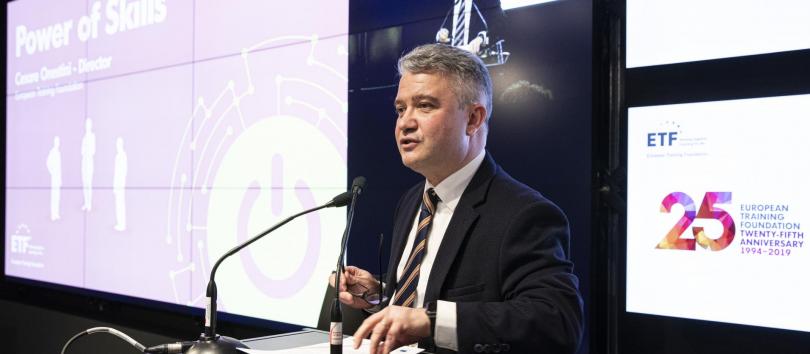
The European Training Foundation celebrates its 25th anniversary
To mark its 25th anniversary, the European Training Foundation invited influencers and decision makers involved in education, employment, social affairs and development to the TownHall Europe last night to celebrate the ETF’s work over the years supporting more than 40 countries in reforming their education and training systems.
Tamsin Rose, Senior Fellow at Friends of Europe moderated the event called The Power of Skills in EU Relations, and introduced ETF director, Cesare Onestini, who said the evening was an opportunity to share the ETF’s story and to talk about its strategy for the future. Onestini recounted the history of the ETF which was created shortly after the fall of the Berlin wall to support education and training in Central and Eastern Europe. It has since worked with over 40 countries, 13 of which are now part of the EU or at various stages of accession. Recently, the European Commission invited the ETF to provide support for the development of a qualifications framework for the whole of the African continent.
The ETF is the only EU agency that receives funding to operate in the external relations field. The power of skills and the empowerment of human capital supported by the ETF lays the foundation for sustainable and inclusive economic and social development, leading to stability and prosperity in the EU’s partner countries. This is “something that is in our interests as much as it is in the interests of citizens of the countries beyond our borders,” Onestini said.
The evening’s keynote speaker, Ayla Göksel, Chief Executive Officer of the Turkish Non-Governmental Organisation Özyegin Social Investments, which focuses on education, early childhood, parenting, and empowerment for women, spoke about her work and her conclusions after 25 years in the field. Although the ETF’s scope is vocational training, said Göksel, studies have shown that the early years are the most formative, which is why, in her view, “a conversation on future skills must include young children and their mothers and fathers.”
A panel and open discussion followed, which included David O’Sullivan, former Commission Secretary General and recent EU Ambassador in Washington, Portuguese MEP Margarida Marques, Vice-Chair of the Committee on Budgets, and Manuela Geleng, European Commission Director for Skills. “Skills mean power”, said Margarida Marques. She stressed the importance of skills in cooperation between the EU and Africa on the subject of migration. Manuela Geleng said vocational training must be modernised and new jobs must be adapted to new tasks. “We will have to change jobs many times in our lives but we have to continue learning throughout.”
Turning towards the future of the ETF, Mika Saarinen, with the Finnish National Agency for Education asked Cesare Onestini how he saw the ETF entering the discussion of continuing education and how it can grow with evolving skills and competencies.
Onestini suggested that systems should be looked at in a comprehensive manner, “the way we administer systems is compartmentalized. We’d like to move across systems, and not end up at any dead end. We take inspiration from what’s happening in the European Union but also from other countries.”
David O’Sullivan underlined the fact that we are in a fourth industrial revolution and lifelong education will be a powerful challenge. He quoted Senator J. William Fulbright, who said the only true test of academic excellence is international comparison.
Did you like this article? If you would like to be notified when new content like this is published, subscribe to receive our email alerts.